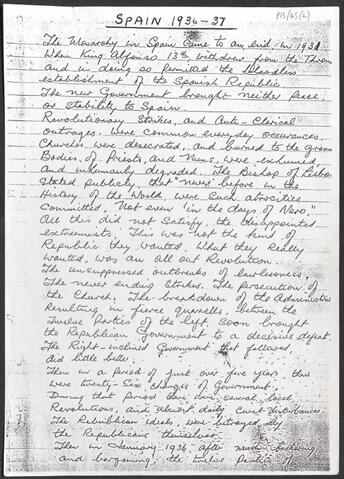
Identity area
Reference code
Title
Date(s)
- 17 May 1997 (date of letter) (Creation)
Level of description
Extent and medium
2 items
Context area
Name of creator
Biographical history
Robert Arthur Stradling is professor emeritus of history at Cardiff University, Wales, and a leading authority on the Spanish Civil War. He has published extensively on the topic and made a number of documentaries for Spanish television and BBC Wales.
Archival history
Immediate source of acquisition or transfer
Content and structure area
Scope and content
Handwritten letter from historian Des Ryan, Moyross, county Limerick to Robert Stradling, enclosing a photocopy of the handwritten memoirs of Maurice Fennell of Rathkeale county Limerick, former Legionnaire of ‘C’ Company of Irish Brigade. The memoirs, entitled SPAIN 1936-1937 begin with the line ‘The Monarchy in Spain came to an end in 1931’ and record Fennell's view of the history of the Spanish Republic, noting ‘The new Government brought neither peace, or stability to Spain. Revolutionary strikes, and anti-clerical outrages, were common everyday occurances, churches were desecrated, and burned to the ground. Bodies of Priests, and Nuns, were exhumed, and inhumanly degraded’. The years leading to the civil war were marked by ‘twenty-six changes of Government… several local Revolutions, and almost daily civil disturbances’, the formation of The Popular Front, outbreak of Spanish Civil War in 1936, and the Irish response stating ‘Due to our historic ties with Spain, and a strong Anti-Communist emotion, which was now engulfing the entire nation, North and South, General O’Duffy had little difficulty in recruiting an Irish Brigade, to fight for Christianity, and Spain, and in an indirect way, for Ireland’. Also notes the passing of the Non-intervention Bill, members of Irish Brigade including many old Irish Republican Army and ex-army officers, setting off for Spain on board the Dun Aengus during stormy weather, stating ‘The storm was still blowing, and the rain pouring down, no food, no sleep, no water, and very little hope. Despair was clearly visible on every face’, and rescue by a German grain boat, stating ‘They then left down a number of wooden ladders tied together, and eventually they were made fast to the rail of the Dun Aengus. However it was like climbing on to a “bucking bronco”. The difference was, that if you lost your grip, or made one slip, you were catapulted into eternity, via the freezing, turbulent, awesome, waves of the Atlantic Ocean’. Also records experiences of Salamanca, stating ‘The huge square was bedecked with beautiful flowers, buntings, and Irish and Spanish flags. The hundred or so tables were attended by charming Signorettes in Native Costume and the food was sumptuous, or so it seemed… after almost seven days of starvation’, and training at Cáceres where he notes ‘Our individual training was carried out in the big Military Barracks… Just outside the back wall, there was a sand-bag embankment… We later learned that it was a shooting range of a different kind. It was here that Red Troops, who were tried, and found guilty, of certain crimes, were executed. It was not a nice sight, I went to see it once, and that was enough’, the daily routine, mass at Church of San Domingo, journey to the Madrid Front and attack by ‘friendly troops’, stating ‘It is amazing how quickly one adjusts to the circumstances, in a situation such as this, one’s fears, and forebodings, seem to vanish and instead there is a feeling of elation, having beaten the defending backs, and sees the line at his mercy, in the dying moments of a Rugby Match’, the atrocities, attacks by ‘the Reds’, mining a railway used by ‘the Reds’, and the final journey home, stating, ‘Our Crusade was ended. We may not have had any great effect on the outcome of the War, but we played our part, to the Best of our ability… it is no small consideration to know that we were on the winning side, and that in so doing we repaid, in a small way at least, part of our long-standing debt to Spain.’ Paginated.
Appraisal, destruction and scheduling
Accruals
System of arrangement
Conditions of access and use area
Conditions governing access
One item in this file contains information relating to persons living or presumed living and is closed for 50 years to protect individual privacy. Review in 2047.
Conditions governing reproduction
Language of material
- English
Script of material
Language and script notes
Physical characteristics and technical requirements
Finding aids
Allied materials area
Existence and location of originals
Existence and location of copies
Available digitally on the University of Limerick Digital Library at https://doi.org/10.34966/uldl.zcnf-m732.
